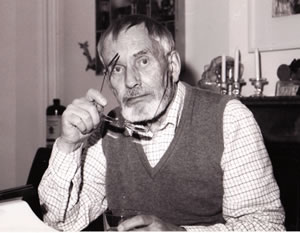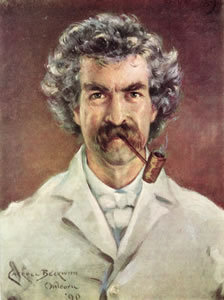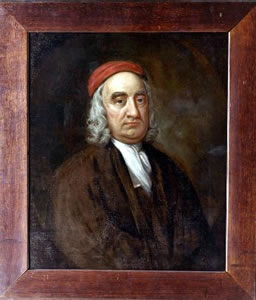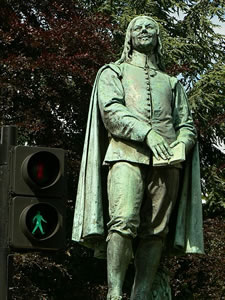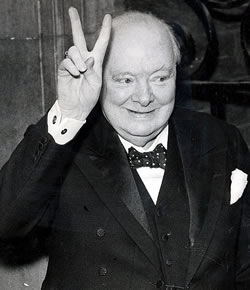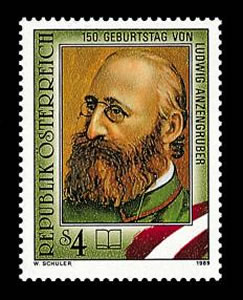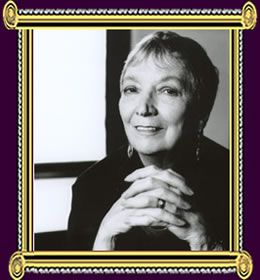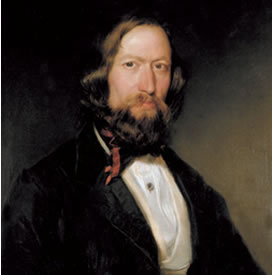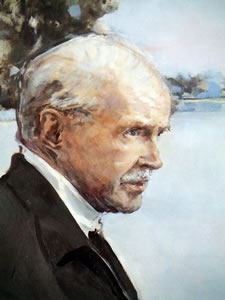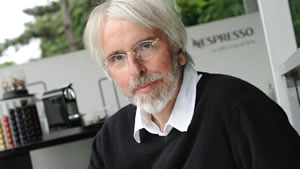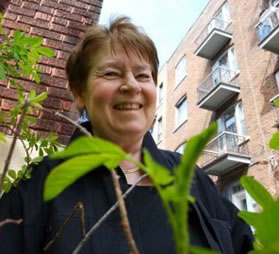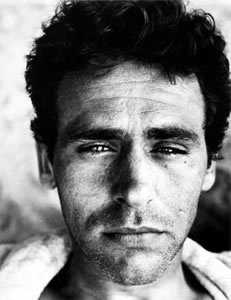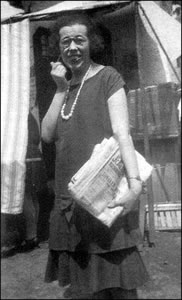De Amerikaanse dichter, schrijver en essayist Lee Klein werd geboren op 30 november 1965 in New York. Zie ook mijn blog van 30 november 2008.
THE SHOPPPINGTOWN DOWN UNDER
In the diving bell-Boschian eggshell
This shopping mall poet descends-
Into the eucalyptus forest in dream time
So as if to be an under cover parker
In an Oceanic “Shoppingtown”
Donning a blazer,
Sporting pins of pewter
Sculpted to be as a bas-relief of a continent in releaf
Purchased from purveyors of
Plaques and memorabilia
Commemorating the games of the twenty seventh Olympiad
“The Olympic store”
Snorkel in mouth sinking
To the escalator
Driving the hive
Foot traffic converging
During the Olympic fortnight surging
Down on the ground
Grownups dressed as mascots are waving
Swimming through the atrium aquarium
Aqueous torch burning
Green and white of cask
For the flame lit by jet action
And through the microphone
Comes forth
These words
Out in the Outback
The Outbacks’ the Outback
But out of the Outback the Outback’s a steakhouse
And down under they build Westfield Shoppingtowns
from which you may need to backdown
Back out to back down to be out of the Outback
I might as well be back out or back out form the Outback
Well at least I am out -out of the Outback
And that’s life in a shoppingtown
Un hey un bamba and de night
Na na nanna na
Life in a Shoppingtown
Paramatta, Sydney, Western Suburbs, New South Wales
A sliding glass door through a parquet meridian
Of a Thomas Cook branch
Here in the commonwealth
To punch up the numbers
To take you on a round trip
Round trip one-day only
Round trip one-day only round trip
Is the impish man formerly working in a travel agency
Now presently working at another travel agency
This Thomas Cook
He has a chestnut head of hair and sideburns
The latter graying
And as he is saying
But he is having difficulty
With his computer
And so he punches the keys grimacing
Then he is up Walking to the exchange window
To get change from travel fares
He is showing them printed receipts
From downloads on his computer portal
Into the Thomas Cook hub
Wearing yellow and blue
What can he do? Flub!

Lee Klein (New York,.30 november 1965)
De Engelse schrijver David Nicholls werd geboren op 30 november 1966 in Hampshire. Zie ook mijn blog van 30 november 2008.
Uit: Starter For Ten
“ALL young people worry about things, it’s a natural and inevitable part of growing-up, and at the age of sixteen my greatest anxiety in life was that I’d never again achieve anything as good, or pure, or noble, or true, as my O-level results.
I didn’t make a big deal about them at the time of course; I didn’t frame the certificates or anything weird like that, and I won’t go into the actual grades here, because then it just gets competitive, but I definitely liked having them; Qualifications. Sixteen years-old, and the first time I’d ever felt qualified for anything.
Of course, all that was a long, long time ago. I’m nineteen now, and I like to think I’m a lot wiser and cooler about these things. So my A-levels are, comparatively, no big deal. And besides, the idea that you can somehow quantify intelligence by some ridiculous, antiquated system of written examinations is obviously ridiculous. Having said that, they were Langley Street Comprehensive School’s best A-level results of 1985, the best for fifteen years in fact, 3 As and a B, that’s 19 points – there, I’ve said it now – but I really, honestly don’t believe that’s particularly relevant or impressive or anything, I just mention them in passing, that’s all. And besides, compared to other qualities, like physical courage, or popularity, or grace, or good health, or good looks, or clear skin, or a rich, varied and rewarding sex-life, just knowing loads of stuff isn’t actually that important. Unless of course you don’t have any of those other qualities, in which case you’re frankly just grateful for what you’ve got.
But like Dad used to say, the important thing about an education is the opportunity that it brings, the doors it opens. Because otherwise knowledge, in and of itself, is a blind alley, especially from where I’m sitting, here, on a late September Wednesday afternoon, in a factory that makes toasters.
I’ve spent the holiday working in the despatch department of Ashworth Electricals, which means I’m responsible for putting the toasters in their boxes before they’re sent out to the retailers. Of course, there are only so many ways you can put a toaster in a box, so it’s been a pretty dull couple of months over all, but on the plus side it’s £1.85 an hour, which isn’t bad, as much toast as you can eat of course, and there’s the radio to listen to, and I like to think I’ve got on pretty well with my fellow members of staff.”

David Nicholls (Hampshire, 30 november 1966)
De Chileense dichter en schrijver Sergio Badilla Castillo werd geboren in Valparaíso op 30 november 1947. Zie ook mijn blog van 30 november 2008.
Confession on a street corner in Madrid close to O’Donell
Where is the little marchioness of Avila in all the length and breadth of Spain?
when the fire of the night escapes my hands
and in every corner of this green room, a secret loses its intimate words
because there is nobody with the desire to discover us here, inside
in this hotel in Calle O’Donell.
So here we are, my dear Santa Teresa,
with a reality that has driven us crazy for more than a week
and I awake me , and I awake you my marchioness, for telling you
that the city still exists beyond the tired dawn
with its faded petals in this interminable calm.
Madrid winks at us, hiding itself like we
In the autumnal foliage of El Retiro.
the Gate of Alcalá will let us pass like other lovers
before
and behind the Prado museum I will tell you that you are only mine,
regardless the wasps that skilfully move and sting
or the peacocks in the neighbouring botanical garden
shouting their existence.
When the clock heralds the morning the suitcases will compel
departure
and you will accompany me as we turn our backs on the day
to avoid what will come,
you will smile nervously like respectful lady, with a faint tremble
in those my Spanish lips.
We will be happy, dear lady, I will say with a hint of sadness
even in the texture of many dreams,
in the endless happenings in so many other places,
perhaps in another hotel in Calle O’Donell.
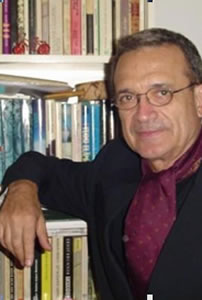
Sergio Badilla Castillo (Valparaíso, 30 november 1947)
De Amerikaanse toneelschrijver en filmregisseur David Mamet werd geboren op 30 november 1947 in Chicago. Zie ook mijn blog van 30 november 2008.
The Diary of Anne Frank
Peter: Goddamned fucking Nazis.
Anne: You want a potato?
Peter: No, I don’t want a potato.
Anne: Take a potato.
Peter: I don’t want a fucking potato.
Anne: Go on, take a potato.
Peter: What do I want with a fucking potato?
Anne: We’re starving.
Peter: (pause) What the hell, I’ll take a potato. (takes potato, eats)
Anne: I kinda like it without salt.
Peter: Salt. That shit’ll kill you.
Anne: Okay.
Peter: I’m trying to make light of a fuckin’ situation here.
Anne: Okay.
Peter: Like when you spilled milk on that cunt’s fur coat.
Anne: That was an accident.
Peter: (Monologue on how there are no accidents)
Anne: Hey, kiss me.
Peter: Why the fuck not?

David Mamet (Chicago, 30 november 1947)
De Amerikaanse schrijver Wil Mara werd geboren op 30 november 1966 in de buurt van Long Beach Island, New Jersey. Zie ook mijn blog van 30 november 2008.
Uit: The Cut
„Barry Sturtz finally ran out of patience.
“T. J.’s numbers for the last two years have been incredible,” he said for the third time. “No one here can debate that. Last year alone—eighty-seven receptions for eleven hundred and forty-four yards and thirteen touchdowns. The best stats for any tight end in the whole damn league!” He pounded his fist on the burnished mahogany table to underscore the last three words.
“No one’s denying his value, Barry,” Palmer responded. “We all know he’s one of the best at his position.” Thirty-six-year-old Chet Palmer had been the Giants’ general manager for the last three seasons. With his thinning hair, dark suit, and tortoiseshell glasses, he looked more like a corporate accountant.
“No, Chet,” Sturtz corrected, almost out of breath, “he is the best at his position.”
“Okay, okay,” Palmer said, hands up defensively. He didn’t have much of a stomach for confrontation. “But we have a contract already, and we expect him to honor it. He’s got one year left. After that, we’ll be happy to discuss a renegotiation.” The third man in the conference room remained silent, as he had throughout most of the meeting.
Sturtz shook his head. “No, we’re discussing it now. T. J. has put up the best stats of any tight end in the league for the last two seasons, and what has he been getting for it? League minimum—this year he’ll make less than five hundred grand. Dinkins, meanwhile, will get two point seven million from the Cardinals, Schaefer will get two point one from Denver, and Barone will get one point eight in Miami. T. J. is performing better than all of them.”
“Barry,” Palmer said calmly, as if his greatest concern during this exercise in organizational thievery was to remain civil, “we took him in the sixth round. We gave him sixth-round money and a sixth-round contract. He didn’t have to take it, but he d—”
“He’s being ripped off!” Sturtz screamed. An icy silence followed, during which the ticking of the wall clock became noticeably louder. Palmer seemed a little nervous now, whereas head coach Alan Gray continued to appear unaffected.“

Wil Mara (Long Beach Island, 30 november 1966)
De Chinese schrijfster Adeline Yen Mah werd geboren op 30 november 1937 in Tianjin. Zie ook mijn blog van 30 november 2008.
Uit: Chinese Cinderella
“AUTUMN 1941
As soon as I got home from school, Aunt Baba noticed the silver medal dangling from the left breast pocket of my uniform. She was combing her hair in front of the mirror in our room when I rushed in and plopped my schoolbag down onto my bed.
“What’s that hanging on your dress?”
“It’s something special that Mother Agnes gave me in front of the whole class this afternoon. She called it an award.”
My aunt looked thrilled. “So soon? You only started kindergarten a week ago. What is it for?”
“It’s for leading my class this week. When Mother Agnes pinned it on my dress, she said I could wear it for seven days. Here, this certificate goes with it.” I opened my schoolbag and handed her an envelope as I climbed onto her lap.
She opened the envelope and took out the certificate. “Why, it’s all written in French or English or some other foreign language. How do you expect me to read this, my precious little treasure?” I knew she was pleased because she was smiling as she hugged me. “One day soon,” she continued, “you’ll be able to translate all this into Chinese for me. Until then, we’ll just write today’s date on the envelope and put it away somewhere safe. Go close the door properly and put on the latch so no one will come in.”
I watched her open her closet door and take out her safe-deposit box. She took the key from a gold chain around her neck and placed my certificate underneath her jade bracelet, pearl necklace and diamond watch, as if my award were also some precious jewel impossible to replace.“

Adeline Yen Mah (Tianjin, 30 november 1937)
Zie voor nog meer schrijvers van de 30e november ook mijn vorige blog van vandaag.

